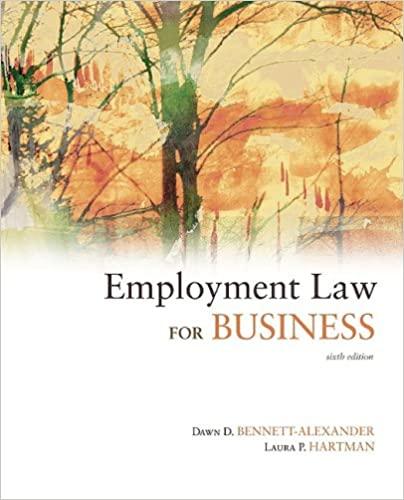Question
Hello, this is my business law case study could you please help me solving this. This is question in my book i need help for
Hello, this is my business law case study could you please help me solving this. This is question in my book i need help for my assignment, I am not using any tutors work this is there in my book.Actually this is the complete question and we have to right each and every principle relates with this case study.
John Rowe had been a successful businessman during his lifetime. When he died, he left his business to his son and daughter and, under the terms of his will, left his widow, Florence, a life annuity that paid her $40,000 per year. Florence was quite elderly at the time of her husband's death. Her son and daughter concluded that the $40,000 annuity might not be sufficient for her to maintain her home and cover her living expenses, since she required a housekeeper to look after the premises. To provide her with additional income, the two children placed $300,000 in the hands of the family stockbroker in their mother's name. The funds were placed with Margaret Lawson, an investment advisor with the brokerage firm. She was instructed to invest the money in the shares of Canadian corporations only, in order to provide Florence with income and dividend tax credits. No part of the funds was to be placed in bonds or the securities of foreign corporations. Florence had no investment experience, and so advised Margaret. She informed Margaret that she intended to leave the choice of investment with her, as she did not wish to have "the worry of making investment decisions." During the next two years, Margaret invested the funds in the shares of Canadian corporations. The
investment income was approximately $40,000 per year. Florence was pleased with the results and, at the end of the second year, wrote a note to Margaret that read: "Many thanks for your hard work and success to date. Invest as you see fit, until further notice from me." During the third year, Margaret switched most of the Canadian shares to bonds, foreign currency holdings, and speculative issues, at a very high investment turnover rate. The high trading activity resulted in very high sales commissions for Margaret, but very little in earnings for Florence. By the end of the third year, Florence's income was down to $3,000, and the net worth of her investment fund had diminished to $180,000. At the end of the third year, Florence notified her son that "something seemed to be wrong" with her investment income. Her son immediately contacted the investment firm. At that point, Margaret's trading practices were discovered, and the value of the investment fund was determined. On the advice of her son, Florence brought an action against the stockbroker and Margaret, an employee of the firm. Discuss the nature of the action that Florence might bring, and the issues involved. Render a decision.
Step by Step Solution
There are 3 Steps involved in it
Step: 1

Get Instant Access to Expert-Tailored Solutions
See step-by-step solutions with expert insights and AI powered tools for academic success
Step: 2

Step: 3

Ace Your Homework with AI
Get the answers you need in no time with our AI-driven, step-by-step assistance
Get Started


